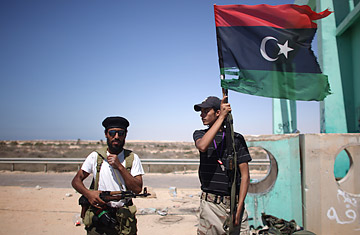
Rebel soldiers are seen at the entrance of the town of Brega, Libya, August 15, 2011.
Despite the divisions within their ranks and the distractions of the holy month of Ramadan, which typically sees a lull in fighting in Muslim countries, the past week has seen Libyan rebels inch closer to toppling Muammar Gaddafi. Their advance into the cities of Brega and Zawiya has ratcheted up pressure on the regime by placing rebel forces at the eastern and western gateways to the capital, Tripoli.
On Thursday, rebel military units entered the oil town of Brega for the first time since March, when a loyalist offensive had pushed them back towards their stronghold of Benghazi. Rebel officials escorted a group of journalists to the deserted city on Monday. Rocket casings covered with desiccated palm leaves lay within view of monolithic housing complexes, peppered with shrapnel.
Gaddafi's forces appear to have pillaged the homes before they left. Bedrooms were ransacked, with drawers emptied onto mattresses. In one house, pictures of the WWE wrestler Batista adorned the door and walls of a room filled with children's coloring books scattered among piles of wrinkled clothes.
The battle for Brega's residential area had been swift, and Gaddafi's troops had retreated without much of a fight. Rebel forces swooped down the coast in the early morning hours last Thursday, armed only with infantry weapons and mortars against the loyalist forces whose artillery capability included Grad rockets and Milan anti-tank missiles. "We have Allah and our guns," exclaimed 41 year old Sami Abd al-Ghadir at the entrance to the town. " We don't need anything else."
Despite al-Ghadir's celebrations, Brega is not completely under rebel control. Gaddafi forces still hold the port, which exported 18,000 barrels of oil per day before the February uprising stopped production. As journalists entered Brega, plumes of smoke were rising in the distance and rebel tanks brought in later were firing shells. Rebel military officials estimated that loyalists retained control of only about 20% of Brega. "It is only a matter of time before we capture the rest of the city," said rebel military spokesman, Colonel Ahmad Bani, outside a Gaddafi communication installation destroyed by NATO airstrikes. "Brega is a part of Free Libya." But loyalist soldiers have dug in, and on Tuesday, snipers killed 26 rebels in Brega's port.
Rebels to the west of the capital, meanwhile, rolled into Zawiyah just 30 miles from Tripoli, and others captured Gharyan, which controls Gaddafi's supply lines from the southern provinces.
Perhaps sensing the momentum shift against him, Gaddafi sought to boost his troops' morale by calling into state television Monday to urge Libyans to "Move forward, challenge, pick up your weapons, go to the fight for liberating Libya, inch by inch, from the traitors and from NATO." In what may be a further sign of desperation, Gaddafi forces fired a Scud missile from his home city of Sirte, 330 kilometers west of Brega. Known for its imprecision, the rocket landed far from its target to the east of Brega. "This just shows that Gaddafi is running out of options. This is the last weapon he has and it is inaccurate," said Mohammad Rjayli, a rebel defense ministry spokesman.
The military gains have boosted rebel confidence at a critical moment, after weeks of internal turmoil highlighted by the assassination of rebel military chief of staff Gen. Abdul Fattah Younes by rival forces on the rebel side. The resulting crisis exposed dangerous tribal tensions, and threatened to undermine their battle against Gaddafi.
Many analysts also believed that the Ramadan fast would make August a slow month in the war, in which there would be little fighting. Instead, rebels have managed to surround the capital from three sides and are slowly tightening the noose around Gaddafi.
